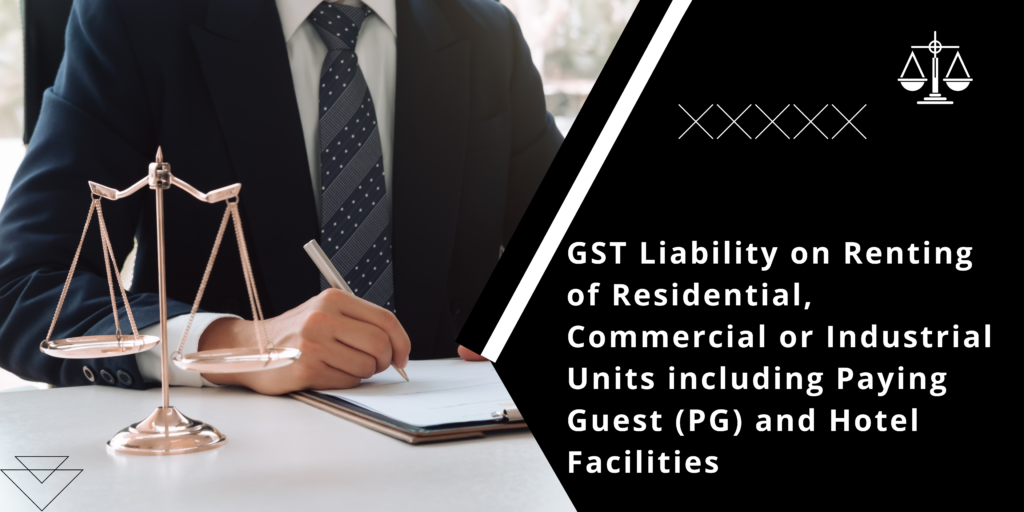GST Liability on Renting of Residential, Commercial or Industrial Units including Paying Guest (PG) and Hotel Facilities

The tax environment underwent a major shift in 2017 with the introduction of the Goods and Services Tax (GST), especially with regard to rental income. Under GST, renting a property—residential or commercial—is now regarded as a taxable supply of service. It is therefore essential to comprehend the subtleties of GST on rent. This article examines the tax rates and provisions that apply to the GST on rent of residential property, the GST on rent on commercial property, the GST on rent computation for rental properties,
the ITC on rental services , etc.
What Does GST Mean for Rent?
The 2017 introduction of the Goods and Services Act, or GST, was the first. Numerous modifications were made to the rental income tax structure with the implementation of the Goods and Services Tax (GST). Renting out real estate is regarded by GST as a taxable supply of services, and both renters and landlords are responsible for paying their share of taxes. GST is applied to the landlords’ rental revenue. A proportion of the rental income is used to compute the tax. GST is additionally due on the rent amount by the tenants who pay it. The landlords deposit this tax to the tax department on the tenant’s behalf, and it is included in the total rent.
Does GST apply when a property is rented out?
The GST Act would classify the rental of an immovable property as a service supply. However, GST will only be applied to specific kinds of rent, like:
- When real estate is leased, rented, granted an easement, or granted a license to inhabit
- When any type of property—whether fully or partially—is leased out for business purposes, whether it be an industrial, commercial, or residential property
Since this kind of rental is regarded as a service provision, taxes would apply. A residential property is GST-exempt when rented out for residential use alone. Any other kind of lease or renting out immovable property for business purposes would be considered a provision of services and would be subject to 18% GST.
When residential property is rented out for personal use as a place to live, there is no GST.
During the 48th meeting of the GST Council, it was made clear that if a registered person rents a residential property for their own use and personal use, there is no GST that needs to be paid.
This indicates that no GST will be charged in cases where a registered person who owns a proprietorship firm rents out a residential property for their personal use as their residence in their individual capacity (as opposed to the proprietorship’s).
When the property is rented to businesses, who has to register?
When a taxpayer’s income exceeds the exemption threshold, they must register for GST and pay taxes. Therefore, your property is taxable if you have given it to a business. You must register with the GST if you make more than Rs 20 lakh a year in business revenue, including rent and any other exempted income.
For individuals who simply offer services, the GST threshold limit is Rs. 20 lakh, which is higher than the Service Tax threshold of Rs. 10 lakh. Many landlords who were previously protected from the Service Tax regime can now feel more at rest, provided they earn an additional Rs. 10 lakhs.
(Note that special category states are not included in the Rs. 20 lakh threshold; the ceiling in these states is Rs. 10 lakh.)
Let’s take an example. Manish lives in Bangalore, and he rents out his Hyderabad home to B Ltd. so that it can be used as a guest house. He is receiving rental revenue of Rs. 30,000 per month, or Rs. 3,60,000 annually, for the Hyderabad property. The location of the immovable property shall be the place of supply for GST purposes.
Therefore, even though the individual lives in Bangalore, Hyderabad—the location of the property in this case—will always remain the place of supply. Since Manish’s annual gross revenue is less than Rs. 20 lakh, he is not subject to the GST.
It should be mentioned that although if this property is used for residential purposes, a firm has been granted usage of it, so it cannot be claimed that the rent paid is from the residential property. The determining element is not how they use the property in question but the type of the property.
How to find out where to charge CGST, SGST, or IGST at the place of supply
It is possible for the owner or landlord to be registered in a state other than the one where the property is located. The landlord has the last say on the matter. To determine if IGST is applicable or if CGST and SGST are charged, they must determine the location of the supply. Here are a few of the cases that we have prepared for you.
Scenario 1:
In one instance, the taxpayer resides in a state other than the one where the rental property is located.
The property’s location will serve as the supply point. It is therefore an interstate supply, and IGST will be applied.
For instance, an 18% IGST would be assessed if Mr. ABC, who is registered under the GST in Bangalore, rented out a business property in Haryana. In Haryana, he is not required to register for GST as well.
Scenario 2:
The State in which the property is located is where both the landlord and the tenant have their registrations.
Both CGST and SGST, at 9% each, would be imposed if the landlord is registered for GST in the same state that the property is located in.
For example, if Mrs. XYZ, a Hyderabad resident, rents out her business property in Hyderabad, 9% CGST and 9% SGST will be applied.
Scenario 3:
The tenant is registered in a different jurisdiction, while the landlord is registered under GST in the same state where the property is located.
It is an intrastate transaction if the landlord registered for GST in the same state that the property is located in. Therefore, regardless of the tenant’s GST registration location, both CGST and SGST would be assessed.
In these situations, if the tenant is not registered in the state where the property is located,
he is not eligible to claim the input tax credit for CGST and SGST.
For example, Mr. PQR from Kochi stays at the ABC Hotel when he travels to Bhopal for a client meeting. He pays Rs. 15,000 in rent when he reserves a room.
The ABC Hotel is situated in the same city as Bhopal, where the owners are registered. Therefore, in this instance, both CGST and SGST would be taxed. The two tax components, however, are not the same.
Since it is not from the state in which he is registered, Mr. PQR is unable to claim the ITC of this GST paid as CGST and SGST of a separate state.
How is GST on rented-out properties calculated?
The rent that the tenant is charged for the property is the basis for calculating GST on rented properties. GST must be paid by the landlord on the rent that is received from the tenant. When renting an immovable property, the GST rate is 18%.
As a result, GST on rental properties will be calculated as follows: GST = (Rent x 18%)/100.
Let’s use an example to better grasp this.
Assume that a business property is rented for Rs. 30,000 a month. After that, the GST will be determined as follows:
GST = 30,000 x 18% = 5,400 rupees
As a result, the landlord’s monthly rent of Rs. 30,000 will need them to pay Rs. 5400 in GST.
When GST is paid on rental income, what are the ITC Provisions?
If the renter paying the rent is registered under the GST Act, they are eligible to receive an Input Tax Credit when GST is applied to rent. The amount of GST paid on the rent might be credited to the taxpayer.
ITC, however, can only be recouped if the asset is used for business or is a commercial property. In addition, ITC is not available if the rented property is used for personal purposes.
In order to collect ITC, the GST charged must also be submitted to the government. Therefore, before claiming ITC, the renters must ensure that the GST collected has been remitted to the government.
ITC for Renovation and Repair
Repairs and renovations to any immovable property intended for rental purposes are not eligible for an input tax credit (ITC) to the tenant.
On the other hand, the landlord may be able to claim an input tax credit (ITC) on the GST paid if they build, repair, or renovate a rental property.
You may be asking how to figure out and pay the tax on your rental income now that you know about the GST on rent.
It is your responsibility as a tenant or a landlord to adhere to the GST regulations in order to avoid fines and interest.
Reverse Charge Mechanism will apply to GST on rent assessed to a registered person for immovable assets by the government or local authority. Nonetheless, the government would deduct GST on its own when the property is rented to an unregistered individual.
Moreover as per the latest recommendation of the 53rd GST Council Meeting,
it was recommended that accommodation services provided for up to Rs 20000 per month shall be exempt from the purview of the GST, provided the tenant has been in a continuous stay of 90 days or more.
For more Information :- https://akyvandco.in/blog/
